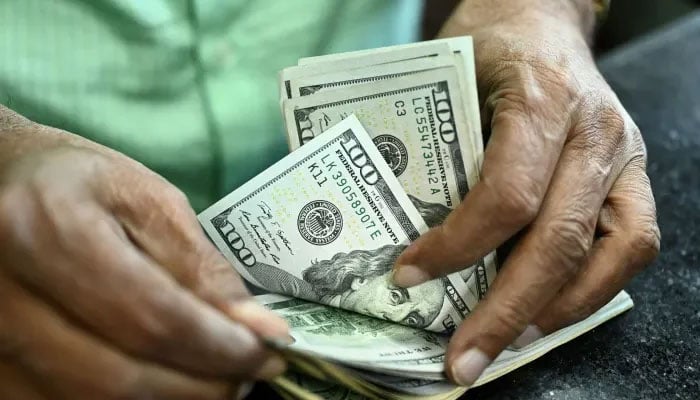Hot money returns in Pakistan’s debt market
KARACHI: Foreign investment in Pakistan’s Treasury Bills (T-bills) has soared to levels unseen since 2020, buoyed by attractive yields and currency stability, a brokerage house reported on Tuesday.
After a four-year lull, international investors' interest in government notes has increased, indicating the return of hot money. Pakistan's assets are trending upward following a staff-level agreement with the International Monetary Fund earlier this month to provide more financial aid for the country.
Pakistan reached a staff-level agreement with the International Monetary Fund in March on the second and last review of a nine-month, $3 billion stand-by arrangement, which, if approved by the global lender's executive board, will disburse about $1.1 billion to the country’s ailing economy.
According to data from the State Bank of Pakistan, there was a net inflow of $82 million in T-bills between March 1 and 22. These inflows have reached $126 million since January 2024. These inflows have totaled $124 million during the nine months of fiscal year 2023/24.
Pakistan received $612 million in net T-bill inflows during FY20, with a peak of $1.4 billion in net monthly inflows in January 2020. “Finally, with high local interest rates and a stable rupee, smart foreign investors are investing in local T-bills through Special Convertible Rupee Accounts (SCRA),” said brokerage Topline Securities in a market note.
“Carry trades are common in countries with high interest rates. But in the case of Pakistan, political uncertainties and currency risk were not allowing investors to engage in this arbitrage,” it said.
“We think once Pakistan secures the new long-term IMF deal, chances are high that more such funds will come to Pakistan to acquire high-yielding government papers, thereby providing short-term support to Pakistan's FX reserves and rupee,” Topline added.
The country's inflation rate decreased to 20.68 percent in March, the lowest level in almost two years, according to recent inflation data that were issued on Monday. This was due to higher borrowing costs that restrained domestic demand and economic growth.
The SBP kept its benchmark interest rate unchanged at a record 22 percent for the sixth consecutive meeting on March 18. The central bank has hiked interest rates by a cumulative 15 percentage points since September 2021 in response to stubborn inflation.
Analysts said the March inflation figures signaled the beginning of a positive real interest rate both currently and in forward projections. “Despite concerns stemming from the recent uptick in fuel prices, the inflation forecast for the coming months is expected to remain subdued due to a notable high base effect,” said Chase Securities in a note.
“Consequently, anticipation is mounting for a potential rate cut in the upcoming monetary policy review,” it added. Pakistan is anticipated to begin talks with the IMF for a longer-term bailout this month. The country’s new government, led by Prime Minister Shehbaz Sharif, wants to carry on with the essential policy reforms to manage spiraling debt servicing, build foreign exchange reserves, and control deficits.
-
 AI Film School Trains Hollywood’s Next Generation Of Filmmakers
AI Film School Trains Hollywood’s Next Generation Of Filmmakers -
 Royal Expert Claims Meghan Markle Is 'running Out Of Friends'
Royal Expert Claims Meghan Markle Is 'running Out Of Friends' -
 Bruno Mars' Valentine's Day Surprise Labelled 'classy Promo Move'
Bruno Mars' Valentine's Day Surprise Labelled 'classy Promo Move' -
 Ed Sheeran Shares His Trick Of Turning Bad Memories Into Happy Ones
Ed Sheeran Shares His Trick Of Turning Bad Memories Into Happy Ones -
 Teyana Taylor Reflects On Her Friendship With Julia Roberts
Teyana Taylor Reflects On Her Friendship With Julia Roberts -
 Bright Green Comet C/2024 E1 Nears Closest Approach Before Leaving Solar System
Bright Green Comet C/2024 E1 Nears Closest Approach Before Leaving Solar System -
 Meghan Markle Warns Prince Harry As Royal Family Lands In 'biggest Crises' Since Death Of Princess Diana
Meghan Markle Warns Prince Harry As Royal Family Lands In 'biggest Crises' Since Death Of Princess Diana -
 Elon Musk Weighs Parenthood Against AI Boom, Sparking Public Debate
Elon Musk Weighs Parenthood Against AI Boom, Sparking Public Debate -
 'Elderly' Nanny Arrested By ICE Outside Employer's Home, Freed After Judge's Order
'Elderly' Nanny Arrested By ICE Outside Employer's Home, Freed After Judge's Order -
 Keke Palmer On Managing Growing Career With 2-year-old Son: 'It's A Lot'
Keke Palmer On Managing Growing Career With 2-year-old Son: 'It's A Lot' -
 Key Details From Germany's Multimillion-euro Heist Revealed
Key Details From Germany's Multimillion-euro Heist Revealed -
 David E. Kelley Breaks Vow To Cast Wife Michelle Pfeiffer In 'Margo's Got Money Troubles'
David E. Kelley Breaks Vow To Cast Wife Michelle Pfeiffer In 'Margo's Got Money Troubles' -
 AI-powered Police Robots To Fight Crime By 2028: Report
AI-powered Police Robots To Fight Crime By 2028: Report -
 Everything We Know About Jessie J's Breast Cancer Journey
Everything We Know About Jessie J's Breast Cancer Journey -
 Winter Olympics 2026: What To Watch In Men’s Hockey Today
Winter Olympics 2026: What To Watch In Men’s Hockey Today -
 Winnie Harlow Breaks Vitiligo Stereotypes: 'I'm Not A Sufferer'
Winnie Harlow Breaks Vitiligo Stereotypes: 'I'm Not A Sufferer'




